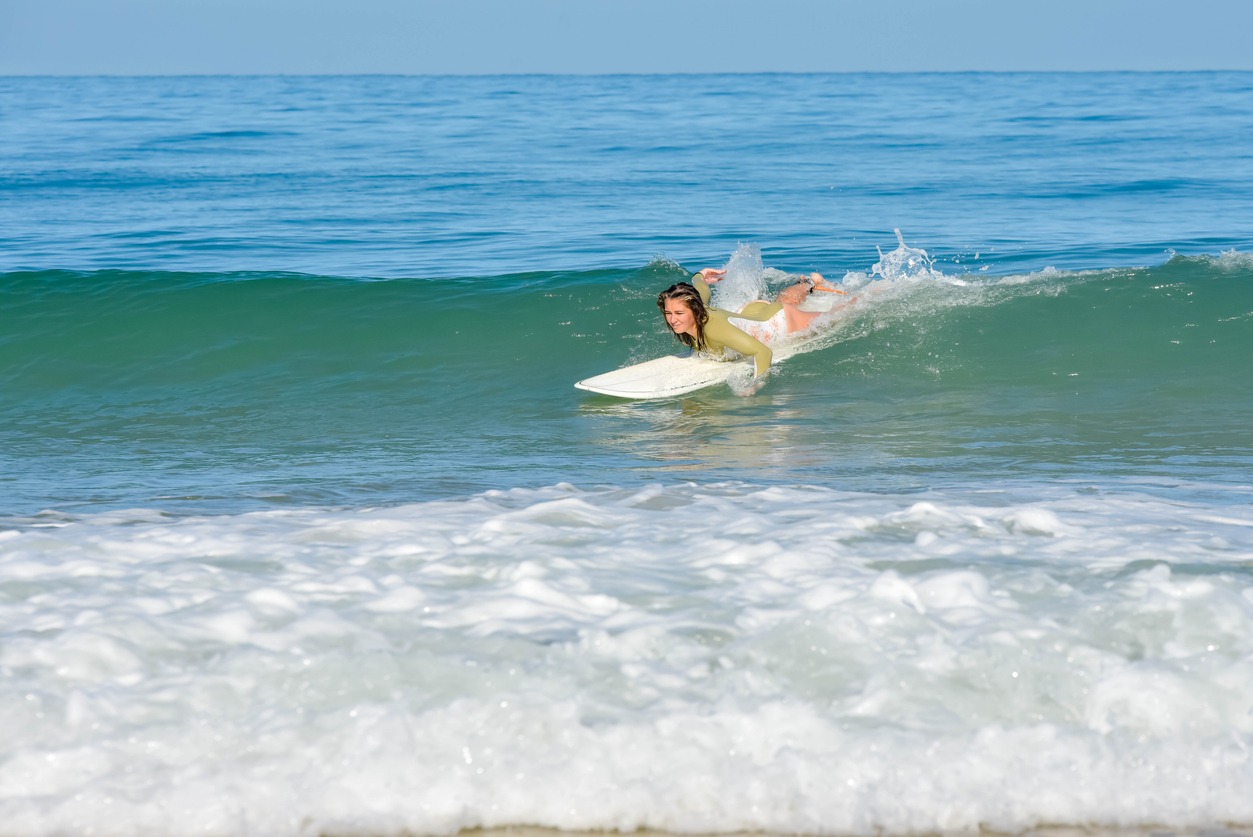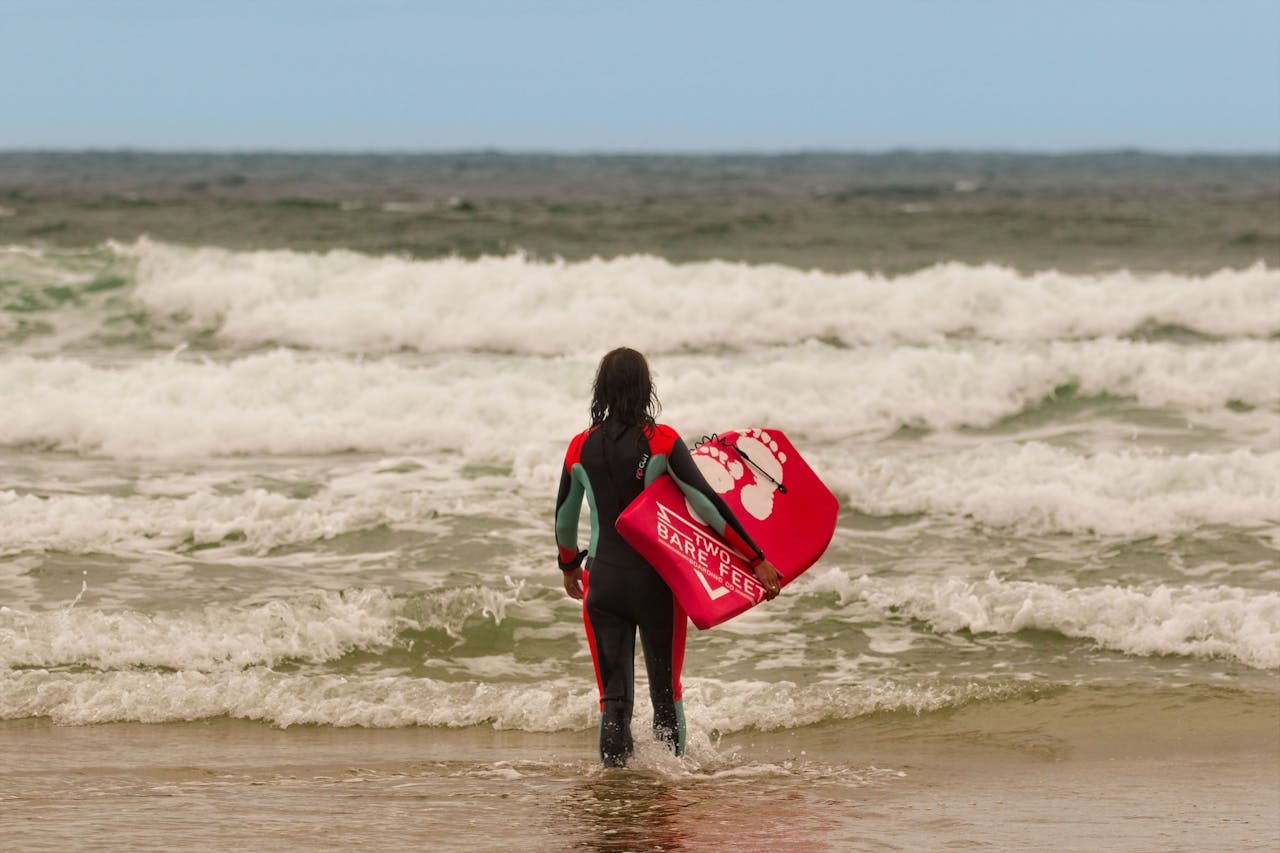Is Bodyboarding Better Than Surfing? Pros and Cons
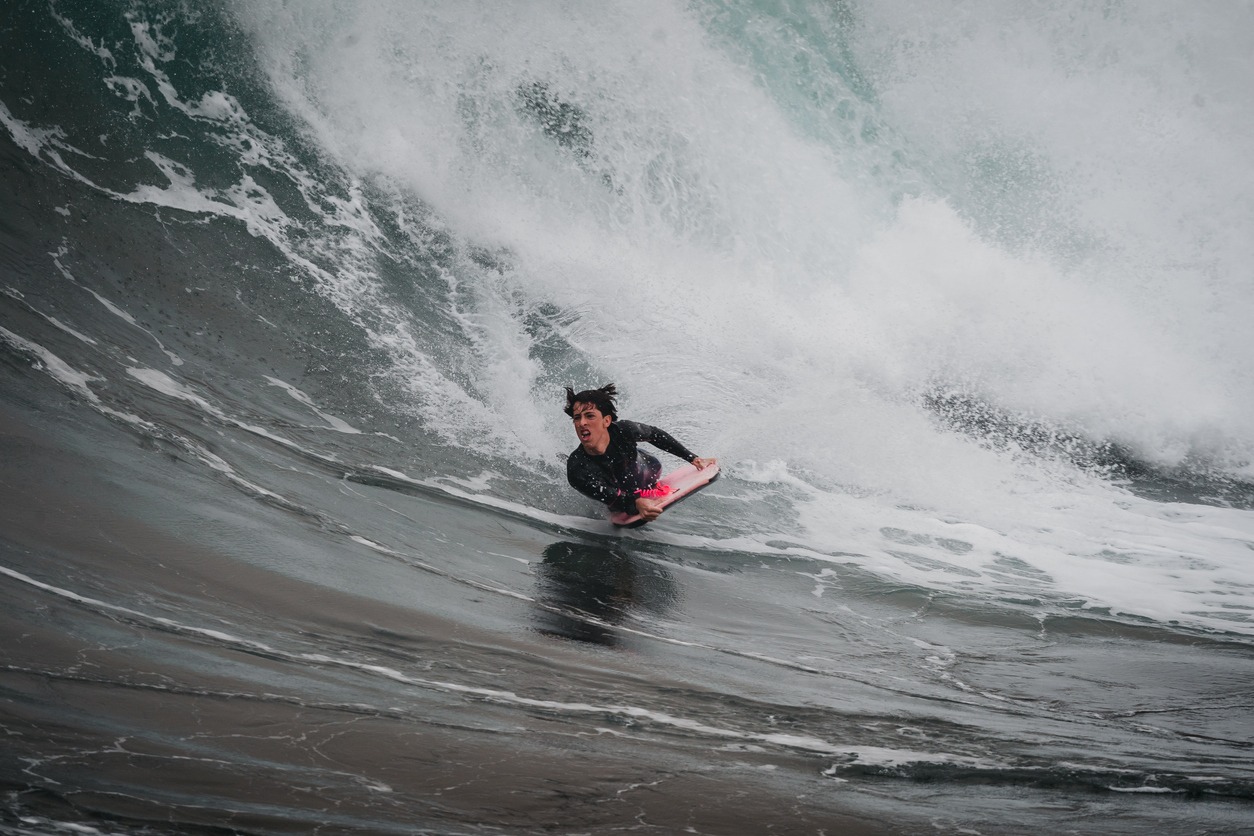
Bodyboarding and surfing each have their unique advantages. You'll find bodyboarding easier to learn, more accessible, and less expensive. It allows you to ride bigger waves and perform impressive aerial tricks. Surfing, however, offers a wider range of maneuvers and creative freedom on the waves. While bodyboarding is less physically demanding, surfing provides a more extensive workout. Both sports nurture supportive communities and deliver exciting wave-riding experiences. Your choice ultimately depends on personal preferences, physical abilities, and goals. Exploring the pros and cons of each sport will help you make an informed decision about which one suits you best.
Accessibility and Learning Curve
When it comes to accessibility and learning curve, bodyboarding has a clear advantage over surfing. If you're looking to quickly immerse yourself in water sports and catch some waves, bodyboarding might be your best bet. With its less steep learning curve, you'll find yourself riding waves much sooner than you would with surfing.
One of the most appealing aspects of bodyboarding is that it requires minimal instruction and practice. You can take to the water with little prior experience and still enjoy the thrill of riding waves. This accessibility makes bodyboarding an excellent choice for beginners who want to get started right away. The reasonably priced boards available further contribute to the sport's appeal for those new to water activities.
Bodyboarding caters to individuals of various skill levels, from complete novices to experienced riders. Whether you're a first-timer or someone with some experience in water sports, you'll find bodyboarding accommodating to your abilities. This versatility allows you to progress at your own pace while enjoying the sport from day one.
The quick start and beginner-friendly nature of bodyboarding set it apart from surfing. You'll spend less time learning techniques and more time immersing yourself in the waves, making it an ideal choice for those seeking immediate fun in the water.
Equipment and Cost Considerations
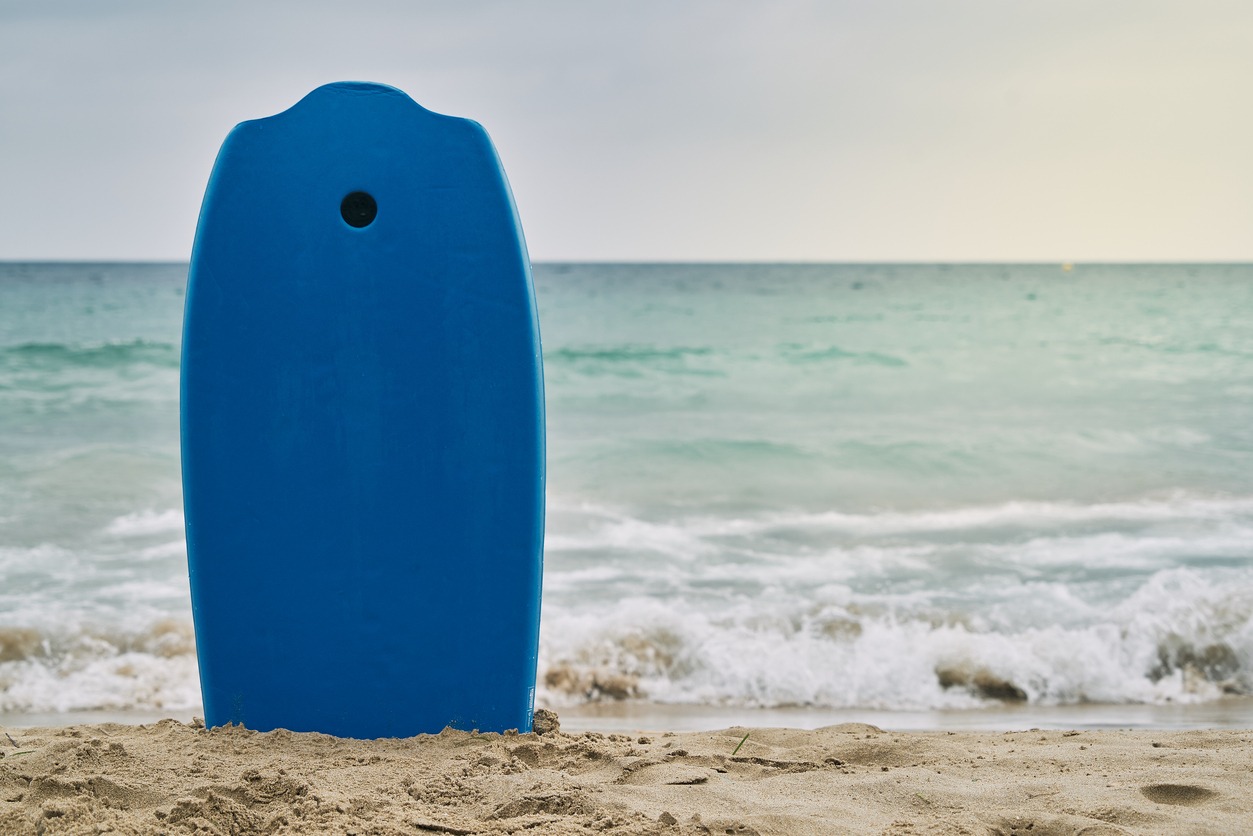
While bodyboarding's accessibility makes it an attractive option for beginners, its equipment and cost considerations further solidify its appeal. When deciding between a bodyboard or a surfboard, you'll find that bodyboards are cheaper and offer several advantages in terms of equipment and expenses.
Consider these key points: Proper-sized bodyboards are essential for children, as boards that are too large can be difficult to control, while too-small boards may cause the child to sink. The appropriate board size should allow 2 inches above the naval for growth, and sizing charts can help find the right fit.
Bodyboards are less expensive than surfboards, making them budget-friendly. They're lightweight and easy to transport, requiring no special equipment. No waxing is needed, reducing maintenance costs and effort. Simpler construction leads to fewer repairs and a longer lifespan. Lower initial investment makes bodyboarding ideal for beginners and children.
These factors contribute to bodyboarding's cost-effectiveness compared to surfing. You won't need to invest in roof racks or worry about elaborate storage solutions for your bodyboard. The absence of waxing requirements saves you time and money on maintenance. Additionally, the durability of bodyboards means you'll spend less on repairs over time.
For parents, bodyboarding offers an affordable way for children to learn water sports without breaking the bank. The lower initial investment allows you to try bodyboarding without committing to expensive equipment, making it an excellent choice for those looking to enjoy the waves on a budget.
Wave Selection and Riding Experience
Wave selection and riding experience set bodyboarding apart from surfing in several exciting ways. As a bodyboarder, you'll find yourself able to access and ride bigger waves that are often off-limits to stand-up surfers. You can drop into steeper, hollower waves later and deeper, giving you a more intense and dramatic ride. This unique advantage allows you to tackle powerful, vertical waves that might be too challenging for traditional surfing.
When you're on a bodyboard, you're closer to the water's surface, which amps up your sense of speed and excitement. You'll feel every ripple and contour of the wave beneath you, creating a more immersive experience. The prone position also grants you greater maneuverability, enabling you to perform impressive aerial tricks and showcasing the sport's technical progression.
One of the most significant differences between the two sports is the ability to ride closeout waves. While surfers might avoid these waves, you can welcome them, turning potential wipeouts into thrilling rides. This versatility in wave selection opens up a whole new world of possibilities, allowing you to make the most of various ocean conditions.
Physical Demands and Fitness Benefits
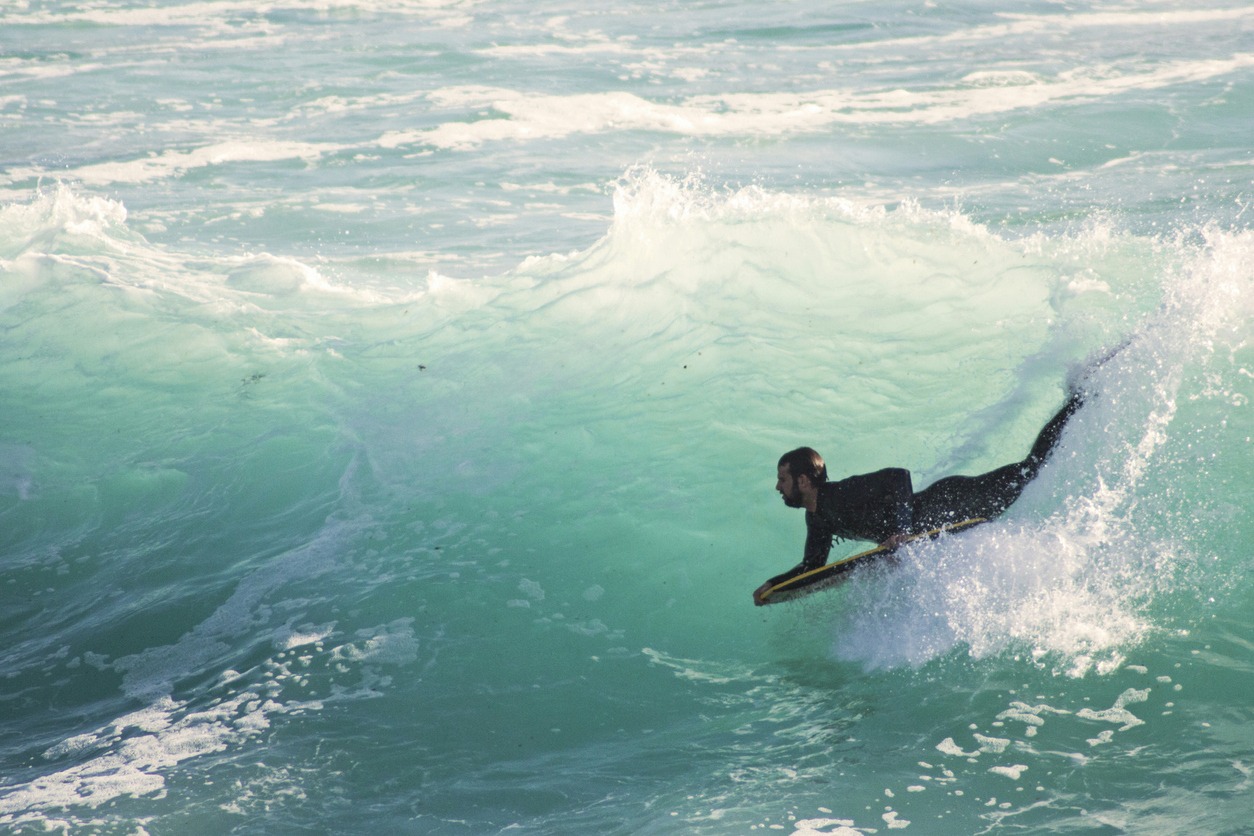
Although both sports offer great fitness benefits, bodyboarding and surfing differ markedly in their physical demands. If you're looking for a more accessible water sport, bodyboarding might be your best bet. It's less physically demanding, making it ideal for those with lower fitness levels or who prefer a more relaxed experience.
Surfing, on the other hand, requires greater balance, upper body strength, and courage. You'll need to invest more time and practice to develop the necessary skills and fitness level. While bodyboarding typically involves fewer wipeouts and less overall exertion, surfing provides a more challenging and extensive workout.
Consider these differences when choosing between the two sports:
- Bodyboarding is more accessible for beginners
- Surfing demands greater balance and upper body strength
- Bodyboarding offers a more leisurely wave-riding experience
- Surfing requires more time to develop skills and fitness
- Practising surfing decreases the learning curve faster than bodyboarding
Both bodyboarding and surfing provide cardiovascular and muscle-toning benefits. However, if you're aiming to improve your overall fitness, surfing may offer a more thorough workout. Ultimately, your choice between these two exciting water sports will depend on your fitness goals, time commitment, and personal preferences.
Maneuvers and Tricks Comparison
When it comes to maneuvers and tricks, surfing and bodyboarding offer distinct experiences. Surfing allows you to perform a wider range of tricks and maneuvers, giving you more creative freedom on the waves. You'll find that surfing provides more opportunities for versatile movements and expressive riding styles. However, this broader repertoire comes with a steeper learning curve, as commanding these techniques can be more challenging than bodyboarding.
If you're looking for a greater sense of achievement and skill progression, surfing might be your best bet. As you advance, you'll tackle increasingly complex tricks, pushing your abilities to new heights. On the other hand, bodyboarding allows you to ride waves that stand-up surfers can't access, particularly those with steeper and more vertical faces. You can take advantage of this unique positioning to perform thrilling maneuvers that are specific to bodyboarding.
While surfing offers more variety in tricks, don't underestimate the excitement of bodyboarding. It has its own set of aerial and aerial-to-prone maneuvers that can be just as satisfying. Ultimately, both sports provide ample opportunities for adrenaline-pumping action and skill development on the waves.
Social Aspects and Community Dynamics
Over the years, bodyboarding has cultivated a reputation for its tight-knit and welcoming community. Unlike surfing, which can be perceived as more exclusive and territorial, bodyboarding offers a more accessible and inclusive environment. You'll find that the bodyboarding community embraces newcomers and experienced riders alike, nurturing a collaborative atmosphere that's hard to match.
When you're just starting out, bodyboarding might seem tricky or difficult, but you'll quickly uncover that experienced riders are often eager to mentor and assist beginners. This supportive dynamic creates a place you must experience to truly appreciate. The camaraderie within the bodyboarding community is evident in:
- Bodyboarding-specific events and gatherings
- Celebration of advancements and achievements
- Encouragement across all skill levels
- Inclusive attitude towards all ages
- Mentorship programs for newcomers
While surfing and bodyboarding share the same playground, the social aspects of bodyboarding set it apart. You'll find that it's not just about riding waves; it's about being part of a community that values growth, support, and shared experiences. For many, this sense of belonging becomes a compelling reason to stick with bodyboarding for a long time.



